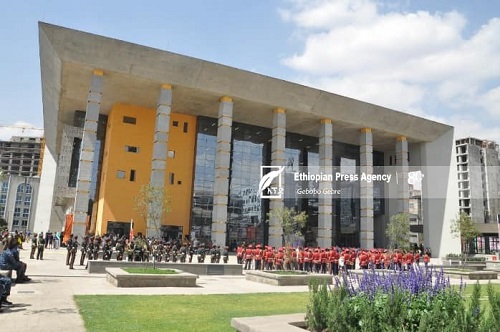
BY TEWODROS KASSA
Recently, Ethiopia has inaugurated the biggest, state-of-the-art public library in Africa. Abrehot Public Library, which is one of Africa’s largest public libraries and that can accommodate over 2,000 readers at a time, is located in front of the House of Peoples’ Representative (HPR) building. The library is named.
Before the construction of Abrehot, meaning enlightenment, most youths and other segments of the society have to visit the National Archives Library to find any written documents. Currently, the opening of Abrehot Public Library in the heart of Addis Ababa at Arat Kilo will have significant role to avail diversified reading materials to the readers at large. Further, it helps promote the habit of reading through expanding the opportunities of finding reading materials in a properly managed and modern library.
In addition, different university, college, secondary, and primary school students will have the opportunities to access any academic books 24/7; because it embraces tremendous books, magazines, newspapers as well as other reading materials that help researchers, teachers, writers, journalists, among others to find books easily and nurture their profession.
One of the library users Yemata Eshete is student of Addis Ababa University, Sidist Killo Campus. She is pleased by the opening of Abrehot Library. She explained the importance of having numerous public libraries throughout the country. The current generation has faced different challenges due to the lack of public libraries with sufficient books and other reading materials, she added.
As to her, unavailability of comfortable, wide, and modern public libraries in Addis Ababa and the rural areas compelled the youth generation to develop different bad habits. From the beginning, every child should have access to free and diversified reading materials to identify their talent. It is usual to see parents’ limitations in availing sufficient reading materials to their children in the country due to economic capability.
More importantly, reading materials are the major inputs to instill culture of reading in children at their early age and produce a productive and patriotic generation. Most youths in the rural part of the country are highly exposed to lack of books, newspapers, magazines and other reading materials. Even they use academic text books mutually with their friends and classmates.
Inaccessibility of academic books and non-academic books will have its own impact on them; particularly to realize their vision of becoming a competitive person in every aspects of life. In fact, youths residing in the capital somehow have a better access to academic and non-academic books than youths living in states.
The former can read fiction, philosophy, history, geography, technology, entrepreneurship, psychology, religious books as well as other current affairs reading materials available in public libraries parallel with attending their education. The more they read books; the more they expand their vision and opportunities. However, those living in areas where libraries are not expanded and equipped with the needed materials might be limited with such experiences, she opined.
“I used to be one of the outstanding students not only from my class but also from my school and my Woreda. I won numerous awards for my academic excellence from my school and the Woreda officials. I feel proud for achieving a higher grade from my classes. However, I only read my academic books. I did not have access to know more about life with the help of books. Today, I understood being active only and successful in academic level is not enough to win life. I advise the current generations to search and read different books and build their future well,” she said.
Facts about Abrehot public library shows that it stretches on an area of 38,687 square meters and houses about 15 terabytes of digital manuscripts (240,000 eBooks). The bookshelf is 1.5 km long that can hold more than 1.4 million books and serves 3,500 people at a time. It is open 24/7. It also has a collection of braille books, syndicate rooms, children reading rooms, conference rooms, a theater hall, a cafe and book stores. It also has well organized underground parking garage for more than 115 cars.
During the inauguration ceremony of the library Prime Minister Abiy Ahmed (PhD) said that Abrehot (enlightenment) Library is one of Africa’s largest public libraries, which can accommodate over 3,500 readers at a time.
“The Abrehot Library is the key to unlocking the nation’s many untold histories and facilitating ways to create wealth. Knowledge is the way out of ignorance. Ignorance is darkness, and one who is in darkness cannot think rationally. So, the library is a great opportunity to get out of ignorance. We can prosper if we lay the groundwork for our children to understand our history and the meaning of freedom. The key to this is knowledge,” he said.
He added, “We can share the wealth and knowledge to the posterity that our forefathers and foremothers have passed down to us only when we have libraries like Abrehot. Such libraries are needed in every sub-city of Addis Ababa. ”
He further explained that Ethiopia is one of the 18 countries in the world that have its own alphabet and is the only country in Africa with its own alphabet.
In sum, Abrehot is well furbished and constructed with mysterious artistic architectural design that inspires readers’ mood to feel good and stay longer in reading. The library was built with a budget of over one billion Birr; and has over 300,000 research papers; aside from 240,000 electronic books. The library has a place for parents to read with their children, children’s reading and playing areas, adequate Braille books for the blind, and a modern cafeteria and conference room. It has also eight bookstores and an amphitheater.
Abrehot (enlightenment) Library
The Ethiopian Herald January 8/2022





